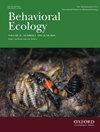条件转移母体效应调节病灶间性冲突
IF 2.2
3区 环境科学与生态学
Q2 BEHAVIORAL SCIENCES
引用次数: 0
摘要
强烈的性选择往往有利于通过伤害雌性来提高繁殖成功率的雄性,这可能会给自然种群带来负面影响。因此,了解哪些因素会调节两性之间的冲突,对于理解雄性和雌性表型的进化以及野生种群的生存能力至关重要。在这里,我们建立了雄性伤害进化模型,同时纳入了雄性伤害对后代质量的母性影响。我们的研究表明,由于雄性伤害会诱发条件转移母性效应,从而降低伤害雄性自身后代的质量,因此母性效应可以部分协调雄性和雌性的进化利益,并显著抑制雄性伤害的进化。这些效应与亲缘关系、竞争规模、交配系统以及雄性伤害是否发生在交配前(即骚扰)和/或交配中/后(即创伤性人工授精或有毒射精)无关,当母性效应影响后代造成(儿子)或抵御(女儿)伤害的能力时,这些效应尤为突出。我们的研究结果凸显了考虑母性效应对揭示性冲突演变的潜在重要性。本文章由计算机程序翻译,如有差异,请以英文原文为准。
Condition-transfer maternal effects modulate inter-locus sexual conflict
Strong sexual selection frequently favors males that increase their reproductive success by harming females, with potentially negative consequences for natural populations. Understanding what factors modulate conflict between the sexes is hence critical to understand both the evolution of male and female phenotypes and the viability of populations in the wild. Here, we model the evolution of male harm while incorporating male-induced maternal effects on offspring quality. We show that because male harm can induce condition-transfer maternal effects that reduce the quality of a harming male’s own offspring, maternal effects can partially align male and female evolutionary interests and significantly curb the evolution of male harm. These effects are independent of relatedness, the scale of competition, mating system, and whether male harm comes before (i.e., harassment) and/or during/after (i.e., traumatic inseminations or toxic ejaculates) mating and are particularly salient when maternal effects influence offspring ability to inflict (sons) or resist (daughters) harm. Our results underscore the potential importance of considering maternal effects to unravel the evolution of sexual conflict.
求助全文
通过发布文献求助,成功后即可免费获取论文全文。
去求助
来源期刊

Behavioral Ecology
环境科学-动物学
CiteScore
5.20
自引率
8.30%
发文量
93
审稿时长
3.0 months
期刊介绍:
Studies on the whole range of behaving organisms, including plants, invertebrates, vertebrates, and humans, are included.
Behavioral Ecology construes the field in its broadest sense to include 1) the use of ecological and evolutionary processes to explain the occurrence and adaptive significance of behavior patterns; 2) the use of behavioral processes to predict ecological patterns, and 3) empirical, comparative analyses relating behavior to the environment in which it occurs.
 求助内容:
求助内容: 应助结果提醒方式:
应助结果提醒方式:


